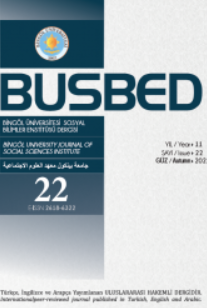İSLÂM MEDENİYETİNİN ORTAYA ÇIKIŞI, TEMEL ÖZELLİKLERİ VE GERİLEMESİYLE İLGİLİ BİR DEĞERLENDİRME
AN EVALUATION ON THE EMERGENCE OF ISLAMIC CIVILIZATION, ITS FUNDAMENTAL CHARACTERISTICS AND ITS DECLINE
Author(s): Yasin YilmazSubject(s): Islam studies, History of Islam, History of Religion, Qur’anic studies
Published by: Bingöl Üniversitesi Sosyal Bilimler Enstitüsü
Keywords: Civilization; Islamic Civilization; Mohammad; Qur'an al- Karim; Decline of Islamic Civilization;
Summary/Abstract: Many civilizations have emerged in the world. Some of these civilizations have acquired a universal quality and left traces in history, while others have remained local and have not reached the universal level. Most historians, politicians and thinkers have expressed ideas about the concept, formation, development and collapse of civilization in terms of the disciplines they focus on with the cultural and scientific accumulation they have. In addition, civilization includes political, social, economic activities and institutions; inventions such as the invention of writing, the invention of printing, as well as values and concepts such as tolerance, trust. Civilizations are flexible; they were influenced by civilizations that lived before them and civilizations that lived after them. Islamic Civilization also received its accumulation in institutionalization, science and management, especially from the experience of Byzantine and Iranian civilization located around the geography in which it was born. Islamic Civilization, which has a flexible understanding, has taken these civil and cultural accumulations that do not contradict the principle of Tawhid and has taken them further by assimilating them within itself. One of the civilizations of universal nature is the Islamic Civilization, and it is a civilization that centres man, based on revelation, prioritizes its basic principles such as rights, law and the right to life, embraces all humanity following the Prophet Muhammad's principles that will lead humanity to happiness without distinguishing language, race, colour and geography. Islamic Civilization, born in the 7th century and manifested itself in religious, political, social, economic and cultural areas such as thought, science, literature, art, architecture between the 9th and 17th centuries, taught how to live according to the fundamental rights of people. One of the essential aspects of Islamic Civilization, which is separated from modern Western civilization, is that most of humanity adopts the principle of prosperity, peace and happiness. Islamic Civilization, which the Prophet Muhammad established in Medina its principles, shows right instead of force, solidarity instead of fighting, brotherhood instead of racism, and respect for spiritual progress.
Journal: Bingöl Üniversitesi Sosyal Bilimler Enstitüsü Dergisi (BUSBED)
- Issue Year: 11/2021
- Issue No: 22
- Page Range: 591-612
- Page Count: 22
- Language: Turkish

